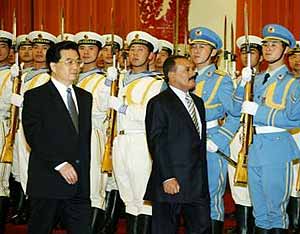04.07.2008
June 27, 2008 (the date of publication in Russian)
Alexei Baliyev
CHINA IS MARCHING TO THE HORN OF AFRICA
Yemen to emerge as a stronghold of Beijing's interests in Africa
 At present, China continues to pursue the policy of closer cooperation with those nations of the Third World which don't enjoy sympathies from the West. Encountering no serious competition, Beijing establishes a number of strongholds for further political and economic expansion. This strategy is well exemplified with China's activity in Sudan, described in Elena Galkina's article "Sudan on the Global Chessboard". In fact, China has become the major economic player in the country since the West introduced economic sanctions under the pretext of the conflict in Darfour – though in fact, ostracism of Sudan reflects the West's aversion to a political regime based on Islamic principles.
At present, China continues to pursue the policy of closer cooperation with those nations of the Third World which don't enjoy sympathies from the West. Encountering no serious competition, Beijing establishes a number of strongholds for further political and economic expansion. This strategy is well exemplified with China's activity in Sudan, described in Elena Galkina's article "Sudan on the Global Chessboard". In fact, China has become the major economic player in the country since the West introduced economic sanctions under the pretext of the conflict in Darfour – though in fact, ostracism of Sudan reflects the West's aversion to a political regime based on Islamic principles.
China's relations with one more – and similarly poor – Arabic state, Yemen, are not so well known. Establishing exclusive relations with this country, China achieved privileged conditions for exploration of natural resources. Yemen owes much to China: its specialists have discovered voluminous oil deposits in the southern part of the country that was once an independent USSR-oriented Popular Democratic Republic of Southern Yemen.
Paying an official visit to Beijing, the official delegation of Yemen's Government expressed gratitude to Chinese comrades for assistance and support. For China, gratitude was not sufficient: the Celestial Empire decided to use Yemen as a stronghold for African strategy.
In this year, China and Yemen signed a joint peacekeeping initiative directed towards reconciliation and gradual territorial reintegration of Somali, the state, once similarly abandoned by the Soviets and later ruined by the US-imposed "democratization".
China's relations with Somali date back to the times of General Mohammed Siad Barre, founder and chair of the Somalian Revolutionary Socialist Party. In 1980s, the Chinese built the Presidential Palace in Mogadishu. Barre's regime was overthrown in 1991. In fact, disintegration of Somali started synchronously with the USSR and Yugoslavia. Eventually, Somali's northern part, once a British protectorate, declared itself an independent state of Somaliland – today, the largest of the world's unrecognized states. Somaliland enjoys relative political stability, unlike other parts of the former Socialist-oriented republic, where anarchy and irregular warfare currently wield. Some of the quasi-states, particularly the adjacent Puntland, are ready to discuss reunification, under the condition of retaining an autonomous status.
The permanent chaos in Somali, with radical Islamist groups attacking one another and pirates savaging traders along the coastline of the Indian Ocean, has long become a headache for adjacent states. In case China, with assistance from Yemen, manages to resolve this crisis, its credibility in Africa is likely to rise.
In its effort to enforce reconciliation in Somali, the government of Yemen launched negotiations with the Union of Shariat Courts, the group that controlled Mogadishu, the former capital of Somali, until 2007 when it was ousted by Ethiopian troops.
Since 1991, Yemen provided assistance to Somalian refugees. During recent years, this humanitarian mission is financially supported from China. At present, over 400,000 Somalis reside in Yemen.
Beijing's activity in Somali and Yemen represents one of the numerous examples of geopolitical penetration of China into various parts of the world. China demonstrates its capability for resolution of regional conflicts where the US policy has failed.
Number of shows: 1100
rating:
3.02
 ENG
ENG 

 ENG
ENG 
